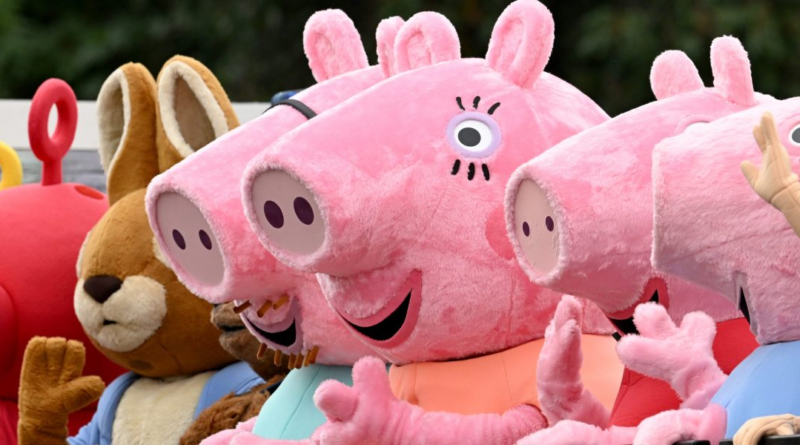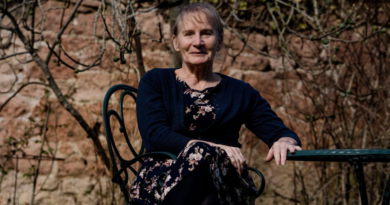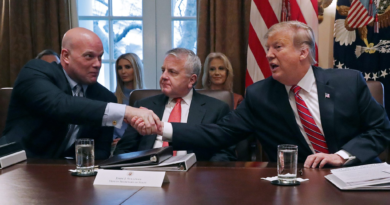Snouts, muddy puddles and British accents: How Peppa Pig became a global cultural phenomenon—and a $1.7 billion business franchise
The family of two-dimensional pink pigs with protruding snouts, dressed in colorful clothes and speaking in English accents, has gone from a humble British TV show to a global staple in households with young children.
On Friday, the Peppa Pig brand celebrated its 20th anniversary, and still tops most charts in kids’ entertainment.
Today, its influence stretches beyond the TV screen. Pepper Pig’s toys, theme parks and games are available in 180 territories. The most recent figures on the franchise’s sales amounted to $1.7 billion in 2022.
“Peppa Pig has already turned into a powerful brand with its own line of toys/merchandise and accessories—even theme parks,” Benjamin Burroughs, associate professor of emerging media at the University of Nevada, Las Vegas, told Fortune. “Peppa Pig differentiated itself by being a quirky, lovable show.”
The staying power of the show and its characters has made it one of Britain’s most significant cultural exports. Just ask one of the parents whose kids watch the show outside the U.K. and suddenly sound British, thanks to Peppa, George, Mummy and Daddy Pigs. Even former Prime Minister Boris Johnson spoke at length about his love for Peppa Pig World in Hampshire, England, and urged people to visit it during a 2021 speech.
Setting itself apart from the herd
The show’s creators—Phil Davies, Mark Baker, and Neville Astley—were already working in production and animation when they had the idea for Peppa Pig 20 years ago. They found a lack of family-centric stories within children’s shows. Their answer? A four-year-old female pig with a penchant for jumping into muddy puddles. Peppa can be bossy but loves her family and friends (some of whom are of the non-pig variety), and embarks on little trips with them and her teddy bear.
The timing of the show’s popularity also helped—it became popular just as personal electronic gadgets did, making it much easier for parents to distract their children with it.
“Peppa Pig did arrive at the time when mobile phones were being used by parents to offload their parenting onto screens, and children were adapting to using screens as a primary mode of engaging with content,” Burroughs said.

Artur Debat—Getty Images
Peppa Pig’s episodes are not exactly Charles Dickens—each is only five minutes long and the storyline covers simple themes in a light-hearted, humorous way, carefully avoiding villains or other sources of conflict. Indeed, the playfulness and interactions between characters struck a chord, both with children and their parents.
“Peppa is a great example of animals who are real people to children, presenting in a positive family unit, doing ordinary activities that all kids love to do, showcasing a playful lifestyle brand with great sound effects (snort!). That formula helped set it apart from other brands,” said Brenda Bisner, Canadian-based streaming platform Kidoodle.TV’s chief content officer.
Kidoodle.TV, available in 160 countries including the U.S., U.K. and Australia, has seen tremendous traction from offering Peppa Pig on its service, Bisner said.
Still going strong
With its strong but simple formula, the show grew from an experiment on Britain’s Channel 5 in 2004 to becoming ubiquitous on subscription services and YouTube. It’s also translated into over 40 languages.
In a more unlikely example of Peppa’s outsized impact, the pigs are seen as something of a counterculture symbol in China, which resulted in thousands of cartoon videos being censored from the social media site Douyin in 2018. But its character and its celebration of Chinese festivals have continued to garner strong interest there.
As the brand grew in reach and popularity, it caught the eye of American toymaker Hasbro, which purchased the studio behind the show, Entertainment One (eOne), for a hefty $4 billion in 2019. The deal aimed to bolster Peppa Pig and other eOne shows’ distribution across platforms globally.
Last year, Peppa Pig was the fourth most in-demand children’s show worldwide, entertainment consulting firm Parrot Analytics told Fortune, and has been the most popular in the U.K., U.S. and France so far this year.
“Peppa Pig is a unique character that resonates strongly with audiences because her courageous, confident personality is allowed to shine. She is a first best friend to preschoolers, encouraging them to jump in together and explore the world around them with confidence,” Esra Cafer, Hasbro’s SVP franchise strategy and management for preschool & fashion, told Fortune. Since Peppa Pig’s purchase, it’s become one of Hasbro’s top franchise brands.
Peppa Pig and her family and friends from the eponymous show are everywhere—from books to toys to attractions. Hasbro has licensing deals with other international brands like Reebok and Audible to bring themed products and services to an even larger audience.
Peppa Pig’s first theme park opened in Florida inside Legoland in 2022. A second opened in Europe earlier this month in Günzburg, Germany, thanks to a €30 million ($32.7 million) investment. Overall, the attractions drew over 31 million visitors last year, Cafer told Fortune.
There’s still more to come, including another attraction in Texas and the world’s biggest Peppa Pig theme park in Shanghai due in 2027.

Ricardo Ramirez Buxeda—Orlando Sentinel/Tribune News Service/Getty Images
The next 20 years
Of course, it’s not been all flowers and sunshine. The franchise has had its fair share of problems, as popularity has brought with it greater scrutiny.
After the show’s initial episodes aired, viewers raised concerns about its characters not wearing seatbelts and bike helmets, prompting a change in the following episodes. In 2017, an episode where Daddy Pig says spiders “can’t hurt you” was banned in Australia, where spider encounters can be lethal.
Concerns around Daddy Pig being constantly fat-shamed have also swirled over the years.
After the franchise was criticized by viewers for not reflecting the reality of different families other than a four-member unit consisting of a mother and father, in 2022, Peppa Pig introduced a same-sex couple. The couple—consisting of two female polar bears named “Mummy” and “Doctor”—sparked a mix of criticism and praise for including LGBTQ+ characters in a preschool show.
Love it or hate it, Peppa Pig isn’t going anywhere. Even if it was unintended, the show has become a British cultural icon. What’s captivated the audience for all these years will continue to pull new fans in the years to come, Cafer said.
“Peppa Pig is as popular as ever. The first 20 years have been incredible, and 2025 marks year 1 of the next 20 years – we have big plans coming,” she said.




